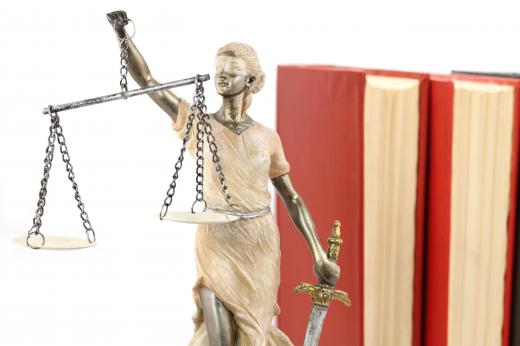At MyLawQuestions, we're committed to delivering accurate, trustworthy information. Our expert-authored content is rigorously fact-checked and sourced from credible authorities. Discover how we uphold the highest standards in providing you with reliable knowledge.
What does "Under Penalty of Perjury" Mean?
“Under penalty of perjury” is a common phrase to anyone who has ever watched a courtroom drama. Perjury is the crime of intentionally lying or misrepresenting the truth to a court or government organization. There are many instances in which statements are made under penalty of perjury, including some that have nothing to do with a courtroom. Understanding the basics of perjury law can help clarify how, and when, this law may apply.
Not all regions have perjury laws; the United States and the United Kingdom both have strict federal laws prohibiting lying under oath or in a sworn statement. Other regions, such as France, do not administer oaths to suspects, so there is no crime of perjury. Generally, any legal system that requires the use of truth oaths or sworn statements may have a law against lying.

If a statement, document, or other form of testimony is under penalty of perjury, it means it is a situation in which the laws of perjury apply. Anyone giving a deposition, testifying as a witness, primary party, or expert in a court case may be required to give an oath not to commit perjury. Some experts suggest the idea works better as a threat than as an actual occurrence. There are very few cases of perjury prosecution in the legal world, mostly because of the difficulty in proving that a person was intentionally and knowingly lying rather than mistakenly giving incorrect information.

Not all untruths, even if intentional, may be considered perjury. Generally, the lie must be shown to have materially impacted the outcome of a legal case; for instance, if a witness lies by saying she saw a particular person shoot a victim, and this evidence is used to convict the accused, the witness could be charged with perjury if the truth comes out. If, however, she lies about her weight, this would likely not be grounds for a perjury charge, as it probably had no material impact on the judge or jury.

In addition to court-related proceedings, some other legal documents are signed under penalty of perjury. Income tax documents, for instance, generally include a sworn signature that verifies that the information given is true and accurate to the best of the preparer's knowledge. In the United States, violating tax-related perjury laws can result in a hefty fine and up to three years in prison. In most cases, a statement or document that is bound by perjury laws will say so.
AS FEATURED ON:
AS FEATURED ON:














Discussion Comments
If a law enforcement officer in Australia signs a statement with the jurat warning of perjury and, it is found out that that person told lies that he was a sworn enforcement officer but in fact he wasn't, is that perjury?
@KoiwiGal - I suspect that it's most ordinary people who end up perjuring themselves and I also suspect that they often do it under threat. That would be the easiest way for a criminal to get off, after all. Threatening witnesses who feel like they have no choice but to lie when they are put on the stand.
And it's no surprise that it keeps on happening either. It must take massive amounts of police resources to keep someone safe if they are being threatened and a lot of the time the crime isn't that big of a deal, so why would they spend those resources?
There have been some pretty famous people who have come up under this kind of law. Bill Clinton is one who people have debated on for a long time (I think it basically boils down to what your definition of intercourse is, in the end) but there have been a lot of others.
I feel like more famous and well off people can get away with this kind of lie much more easily than ordinary people, which is disgusting really. Perjury punishment should be universal, because the court system should be as inviolate as possible.
I wonder how many innocent people have been sent to prison, basically because the testimonies were affected by perjurers.
This makes me think of Game of Thrones, where anyone who breaks their sworn oath (for example, a deserter from the Nights Watch) is executed.
I guess the perjury penalty is milder than that because it is "only" an oath not to lie, but I know in some countries it's still considered an action worthy of the death penalty to commit treason, which is a kind of oath breaking as well.
I can definitely see the practical side of it, since you would really want people to have every reason to tell the truth in court (or on their taxes) but I find it most interesting because of that link to our history.
Post your comments